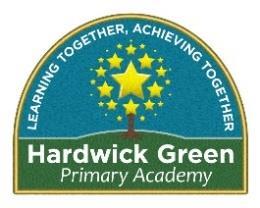Hardwick Green Primary Academy Curriculum Principles
As a staff, we agreed on seven core values that underpin everything we do in school. These are values we seek to develop in our children. We also agreed on a further nine key principles for our curriculum that inform our pedagogical approach and the types of activities set as part of the implementation of the curriculum. These are detailed below:
Our core values – RESPECT:

All teaching and experiences at Hardwick Green will support children to develop the values of:
• Resilience
• Empathy
• Self-awareness
• Positivity
• Excellence
• Communicant
• Teamwork
In addition, our Commando Joe’s character curriculum explicitly teaches these values.
The following ‘drivers’ are key features of the Hardwick Green curriculum…
Excellence

Teachers have high expectations and children will be set work that is aspirational.
Children take pride in all of their completed work.
Children will work towards a purposeful final outcome, as the culmination of their learning which will be explained at the start of the topic.
Re-drafting, editing and improving is encouraged to develop excellence.
The school is clean, neat and tidy and has state of the art resources to support excellent teaching and learning.
Knowledge

The curriculum is knowledge-rich Regular retrieval practice is used to meet our aim of children knowing more and remembering more
Careful attention is paid to the different types of knowledge necessary for each subject. These are carefully mapped out in progressions which start in EYFS and go across school to the end of Year 6.
Knowledge is prioritised so that children can develop a deep understanding of each concept.
All children will be expected to learn powerful knowledge that helps them make sense of the world.
Staff are well read and subject experts are used to develop teaching.

Children are expected to work hard and frequently work independently.
Children take responsibility for their classroom, their belongings and their resources.
Children are encouraged to take and manage their own risks
Children collaborate with their peers but there is always individual accountability

Progress

The curriculum is the progression model
The sequence of learning is carefully considered so that knowledge is built on year-on-year, including carefully linking each subject from the Early Years Foundation Stage.
Domain specific knowledge and skills are taught and practiced discretely – there are no compromised made by trying to ‘force’ curriculum links where they are not naturally there.
End of unit outcomes demonstrate the learning that has taken place.

We know that novices and experts think differently, and that most children are novices at most points in their journey at primary school.
This means that, in our curriculum, we don’t expect children to ‘be historians’ or ‘be scientists’ in the same way that adults would, because we know that these experts behave differently.
Instead, we have a curriculum that allows our novice learners to deepen their learning and move towards becoming experts over time.
Reading

Reading, especially early reading, is the priority.
In most lessons, children are expected to read about the subject matter
Stories are used to enhance learning and make it more memorable.
The books that children read will often be linked to the topics studied.
We aim to develop children’s vocabulary through wider reading and explicit teaching.

We will seek to develop children’s cultural capital across our curriculum.
There is awe and wonder in the classroom, but it is the substance of the subject that is awesome and wondrous.
Schools trips and visitors are prioritised through a structured programme, culminating in an overseas residential
We will provide a wide range of extracurricular clubs and opportunities.

Oracy is the ability to articulate ideas, develop understanding and engage with others through spoken language.
In school, oracy is a powerful tool for learning; by teaching students to become more effective speakers and listeners we empower them to better understand themselves, each other and the world around them.
We work with the Voice 21 oracy framework to implement a planned, structured curriculum to develop children’s oracy across all of their work.
Discussion and debate

Children will be encouraged to have a personal response to what they have learned about and what they are experiencing.
Children learn tolerance through exposure to different ideas, beliefs and ways of living. They debate and discuss these ideas.
Discussion and debate across the curriculum is a powerful vehicle for developing children’s oracy.
Novices and Experts Independence Enrichment Oracy